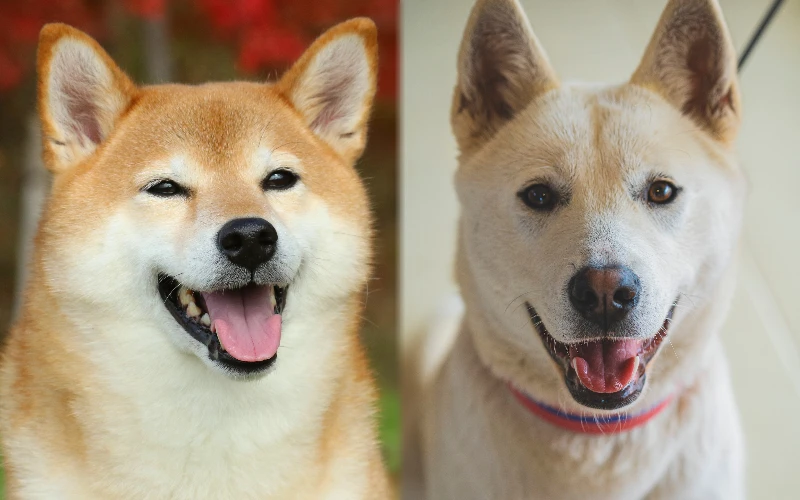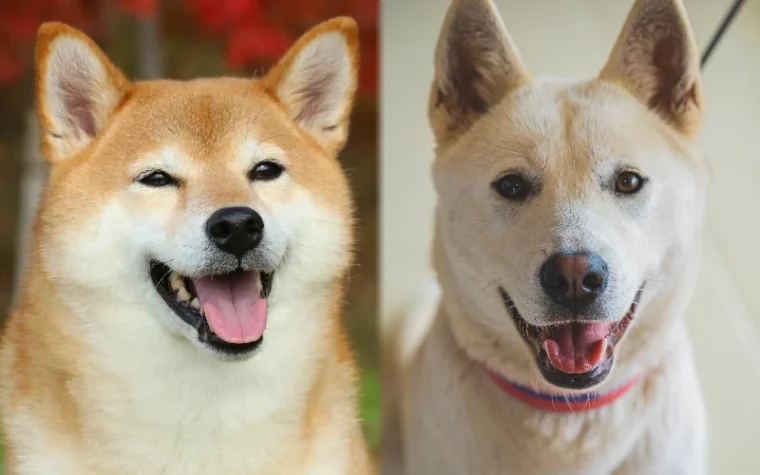- August 3, 2023
Shiba Jindo Mix: Pictures, Guide, Info, & Care


Click Below to Skip Ahead
The Shiba Jindo is a mix of two loyal, strong, and athletic Asian breeds: the Shiba Inu and the Jindo. The former is an ancient Japanese breed that was bred to be an adaptable, well-mannered hunter and companion, while the latter was developed on an island off the coast of South Korea as an independent hunter and discerning guardian.
These two breeds are remarkably similar and share traits like alertness, courage, loyalty, and even-temperedness. While a mix of these two can take on the traits of either parent breed, the puppies are likely to be intelligent, fiercely loyal, and strong-willed companions.
Breed Overview
Colors:
Black and tan, cream, red, sesame, brindle, fawn, gray, white
Suitable for:
Active families, those looking for a low-shedding dog
Temperament:
Loyal & loving, intelligent, easy to train, friendly, gets along with other pets
The Shiba Inu and the Jindo have similar backgrounds. Both were used as hunting or guard dogs, companion dogs, and athletes, prized for their bold, brave, and alert temperament. Both breeds are fiercely loyal, which means that a mix of these two dogs will most likely be extremely faithful dogs to their one owner.
Shiba Jindo Characteristics
Energy:
+
High-energy dogs will need a lot of mental and physical stimulation to stay happy and healthy, while low-energy dogs require minimal physical activity. It’s important when choosing a dog to make sure their energy levels match your lifestyle or vice versa.
Trainability:
+
Easy-to-train dogs are more skilled at learning prompts and actions quickly with minimal training. Dogs that are harder to train will require a bit more patience and practice.
Health:
+
Some dog breeds are prone to certain genetic health problems, and some more than others. This doesn’t mean that every dog will have these issues, but they have an increased risk, so it’s important to understand and prepare for any additional needs they may require.
Lifespan:
+
Some breeds, due to their size or their breeds potential genetic health issues, have shorter lifespans than others. Proper exercise, nutrition, and hygiene also play an important role in the lifespan of your pet.
Sociability:
+
Some dog breeds are more social than others, both towards humans and other dogs. More social dogs have a tendency to run up to strangers for pets and scratches, while less social dogs shy away and are more cautious, even potentially aggressive. No matter the breed, it’s important to socialize your dog and expose them to lots of different situations.

Shiba Jindo Puppies
Shiba Jindo mixes are not purebred dogs or a new “designer breed” emerging on the market, so there are few official breeders. This combination most likely happens due to accidental mating or a one-off litter, so they can be difficult to find. Breeders can charge a wide range of prices for puppies as well.
You may find Shiba Jindo puppies in a shelter or rescue organization as puppies or adults. Though rescues charge different adoption fees to cover their operating costs, you usually benefit from spaying or neutering, deworming, vaccinations, and other basic veterinary care for your fee.


Temperament & Intelligence of the Shiba Jindo
Are These Dogs Good for Families? 👪
Both Shiba Inus and Jindos are great family dogs and show a lot of loyalty to their owners. They can be a good fit for children, provided the kids are taught to respect the dog’s space. It’s important to never leave a dog and child together unsupervised, no matter how much you trust both of them. As children get older, the Shiba Jindo could become a best buddy, jogging partner, or hunting companion.
Does This Breed Get Along With Other Pets?
Shiba Inus and Jindos were bred to be hunters, so they share an extremely high prey drive. It’s not a good idea to put a mix of these two breeds in a home with small pets, cats, or small dogs, as it’s likely to be a dangerous situation for the other animal. Even if a Shiba Jindo is raised with a small animal, it’s always possible for the dog to see the animal as prey and chase, hunt, or kill them. Shibas and Jindos can get along with other dogs as long as everyone is well-socialized and they’re similar in size.

Things to Know When Owning a Shiba Jindo:
Food & Diet Requirements 🦴
Shibas and Jindos are high-energy dogs, so it’s likely that a mix of these two breeds will also be athletic and lively. They need high-quality food that supports their energy needs, especially as puppies, and provides a complete and balanced diet.
Exercise 🐕
These two breeds have been developed as hunting dogs, so they need plenty of exercise to stay physically and mentally fit. Plan on exercising your dog daily, at minimum, either by playing in the house, going for a brisk walk, or running around the yard. These intelligent dogs need mental stimulation as well and enjoy exercising their minds with obedience training, trick training, and interactive toys.
Training 🎾
As two hunting breeds, the Shiba and the Jindo are intelligent, independent dogs that can be a joy to train, but they do think for themselves. These dogs are usually not overly hyper, fearful, or aggressive unless they have negative associations. Both Shibas and Jindos are one-person dogs, however, and may suffer separation anxiety, resource guarding, or protective behaviors as a result. Early socialization and basic obedience are a must, but you can continue training throughout your dog’s life to have a well-adjusted and confident dog.
Grooming ✂️
Another trait the Shiba and Jindo share is a thick double coat that has a thick undercoat and smooth topcoat. While this coat keeps these dogs warm in winter and cool in summer, they do shed often and require a lot of brushing to keep their undercoats from becoming matted or tangled. In addition, you will need to trim your dog’s nails, clean their ears, and brush their teeth.
Health and Conditions 🏥
Shiba Inus and Jindos are long-lived and healthy dogs that aren’t prone to a lot of health conditions, but there are a few things to look out for with the mixed pups. Allergies are common in Shibas—as with most breeds—as well as hip dysplasia, patella luxation, and eye disorders, all of which can be screened by breeders. For the Jindo, the biggest health concerns are hypothyroidism and discoid lupus.
Minor Conditions
- Skin allergies
- Hypothyroidism
Serious Conditions
- Hip dysplasia
- Patella luxation
- Eye disorders
- Discoid lupus
Male vs Female
There aren’t a lot of differences between the temperament and behaviors of the male and female Shiba Jindo, but there could be a size difference. The Jindo is the larger of the two parent breeds, so it’s possible to get a much larger male puppy than a female from the same litter.
Behaviorally, most problems can be prevented with spaying and neutering. This not only controls some hormone-related behavior like roaming and aggression, but it can prevent serious reproductive issues and cancer.
One important thing to note is that both Shiba Inus and Jindos are known for being same-sex aggressive. If you choose to get a male or female, it’s best to stick to only opposite-sex dogs in the household. While there are no guarantees, animosity between same-sex dogs can be more challenging to manage and correct than between opposite-sex dogs.

3 Little-Known Facts About the Shiba Jindo
1. Shiba Inus Are an Ancient Breed
Shiba Inus have been tied to ancestors that most likely accompanied the earliest immigrants to Japan in 7000 B.C. Archeologists have found remains of dogs resembling Shibas in sites that were inhabited by the Jomon-jin people.
2. The Jindo Is a Cultural Asset
The Jindo falls under the Republic of Korea Preservation of Cultural Assets Act No. 53, also known as the Korea National Treasure #53. These dogs are considered a beloved piece of Korean history and culture, so much so that there’s an institute dedicated to the research and preservation of the breed.
3. Shiba Inus Almost Became Extinct
The Shiba Inu was used as a hunter and companion in Japan for thousands of years, but World War II almost wiped out this breed. Many died in the bombing raids during the war or distemper, a highly contagious canine viral infection, afterward. Breeding programs managed to bring the breed back.

Final Thoughts
Hailing from Japan and Korea, respectively, the Shiba Inu and the Jindo are two loyal, brave, and independent breeds developed to hunt, guard, and act as faithful companions to one owner. Puppies from a mix of these two breeds are likely to take on these signature traits and thrive with consistent, active owners committed to earning their loyalty.
Featured Image Credit: Left – Rin Seiko, Shutterstock | Right – KOREAN JH, Pexels
Tags
What do you think?
Related Articles

New Puppy Checklist: Gear You’ll Need for Your New Dog
Getting a new puppy is really exciting, but before you welcome them home, it’s important to prepare your space for them. Since puppies need a

How Big Do Mini Poodles Get? Vet Reviewed Average Weight & Growth Chart – Dogster
The information is current and up-to-date in accordance with the latest veterinarian research. Learn more » When you buy a Miniature Poodle, you might not

Can Police Dogs Smell Nicotine? Vet Verified Facts & Info – Dogster
The information is current and up-to-date in accordance with the latest veterinarian research. Learn more » While cigarette sales have been declining steadily for decades,

How Old Is 5 in Dog Years? Vet-Approved Guide to Each Size of Dog – Dogster
The information is current and up-to-date in accordance with the latest veterinarian research. Learn more » A common method for calculating a dog’s age is

